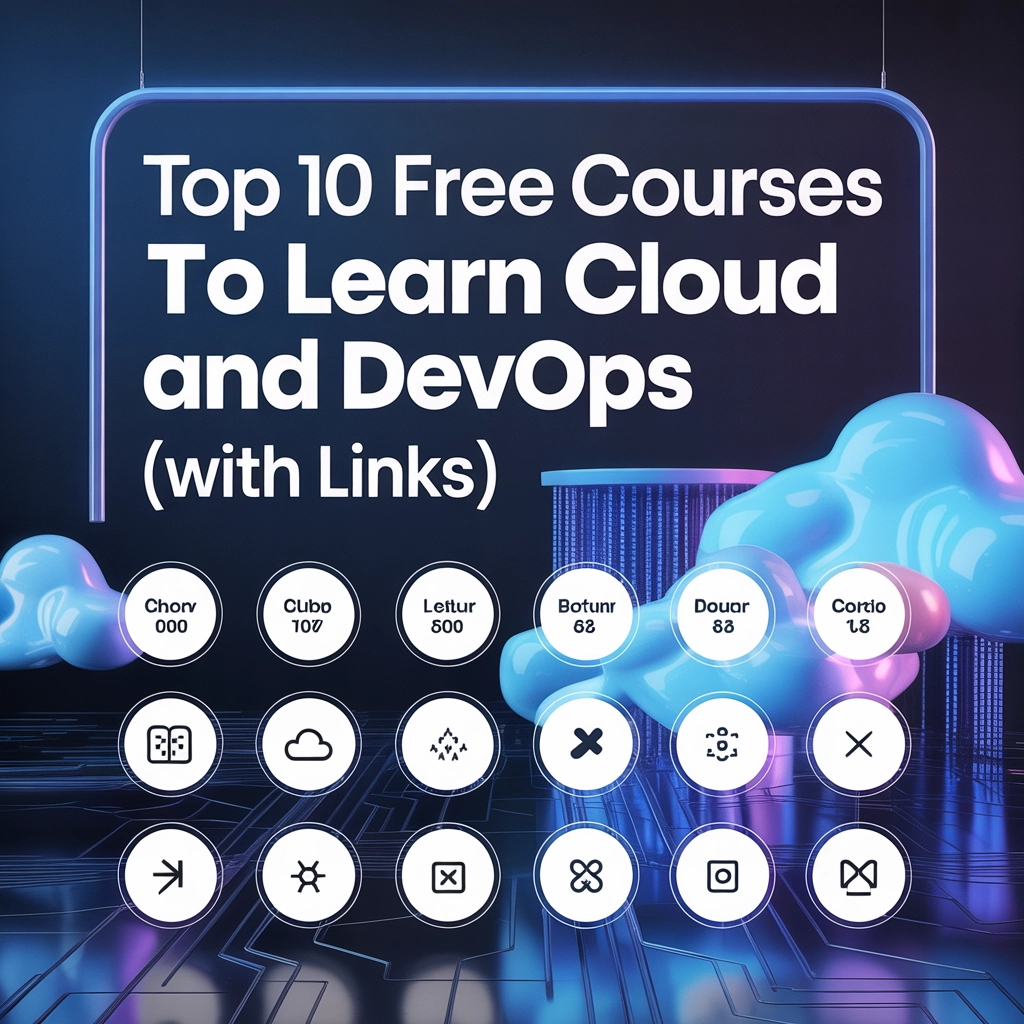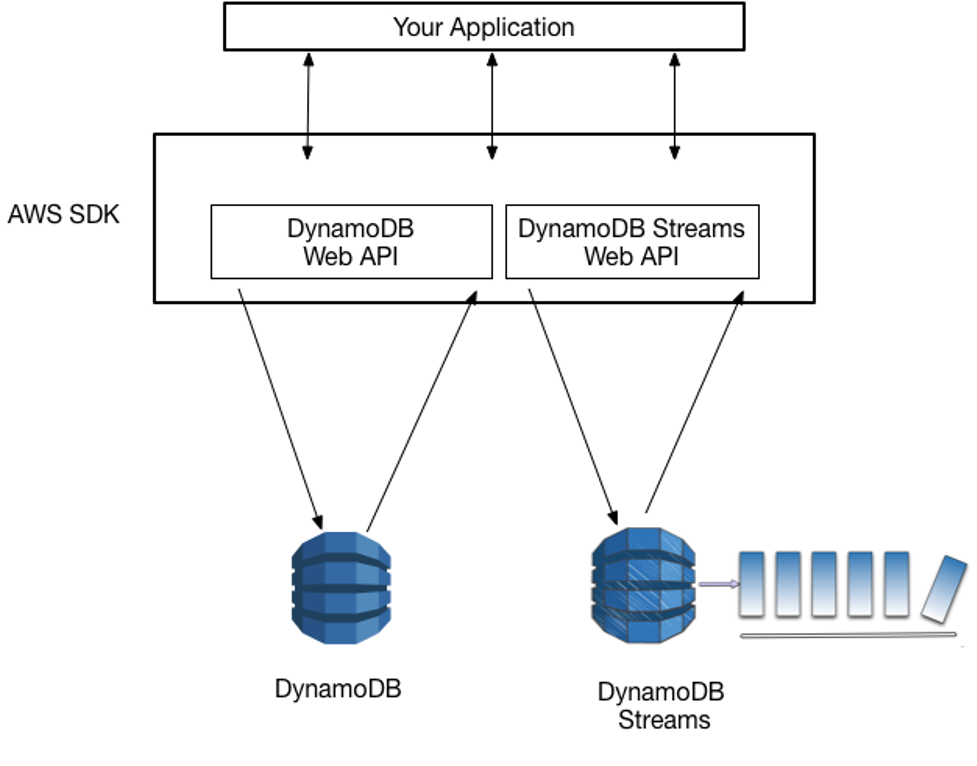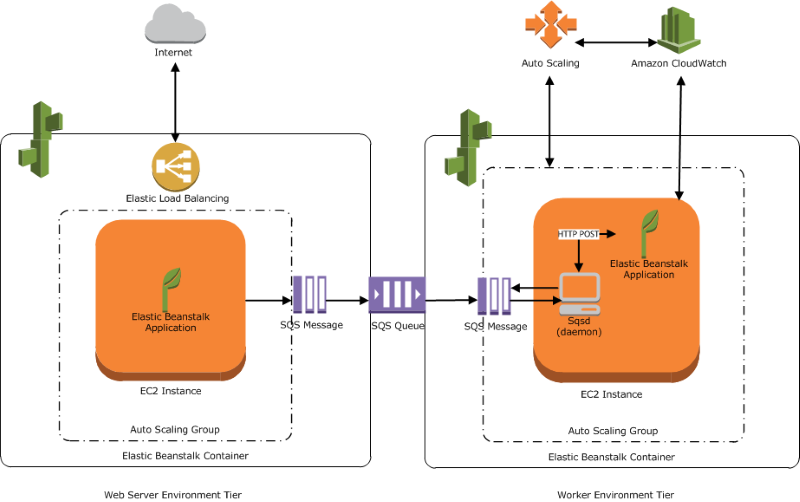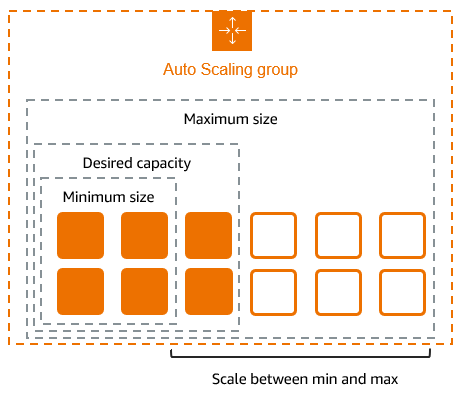In today's fast-paced tech world, Cloud Computing and DevOps skills have become essential for IT professionals looking to advance their careers. Whether you're just starting out or looking to upskill, these technologies offer exciting opportunities with competitive salaries and growing demand.
The good news? You don't need to spend thousands on bootcamps or certifications to begin your learning journey. There are plenty of high-quality, free resources available online from industry leaders and educational platforms.
In this blog post, we've researched and compiled the top 10 free courses that will help you build solid foundations in Cloud Computing and DevOps. Let's dive in!
Cloud Computing Courses

1. AWS Fundamentals with 2 Projects: Cloud for Beginners (Udemy)
Link: AWS Fundamentals with 2 Projects
This beginner-friendly course serves as an excellent introduction to Amazon Web Services, the leading cloud provider with over 33% market share. What makes this course stand out is its practical approach—you'll get hands-on experience through two real-world projects.
What you'll learn:
- Core AWS services and concepts
- How to set up your first AWS account
- Infrastructure as a Service (IaaS) fundamentals
- Practical implementation through guided projects
- Basic cloud security concepts
Duration: Approximately 5 hours
Skill Level: Beginner
Certificate: Yes (Course Completion)
2. Google Cloud Fundamentals: Core Infrastructure (Coursera)
Link: Google Cloud Fundamentals
Google Cloud Platform (GCP) is rapidly growing in popularity, especially for data science and machine learning workloads. This official Google course provides a comprehensive introduction to GCP's core services.
What you'll learn:
- GCP computing and storage options
- Resource and policy management
- Key services like Compute Engine, Cloud Storage, and Kubernetes Engine
- How to choose the right Google Cloud services for your workloads
- Foundation for pursuing Google Cloud certifications
Duration: 13.5 hours
Skill Level: Beginner
Certificate: Yes (available with completion)
3. Cloud Computing Basics (Cloud 101) by LearnQuest
Link: Cloud Computing Basics
This 8-hour course, taught by renowned instructor Jim Sullivan, provides an excellent overview of cloud computing fundamentals. It's perfect for those who want to understand the underlying concepts before diving into a specific cloud platform.
What you'll learn:
- Cloud deployment models (public, private, hybrid)
- Service models (IaaS, PaaS, SaaS)
- Cloud architecture principles
- Essential cloud terminology
- Business benefits and considerations of cloud adoption
Duration: 8 hours
Skill Level: Beginner
Certificate: Available upon completion
4. Microsoft Azure Fundamentals (Microsoft Learn)
Link: Azure Fundamentals
Microsoft Azure is one of the "big three" cloud providers alongside AWS and GCP. This free learning path from Microsoft offers a solid foundation for understanding Azure services and capabilities.
What you'll learn:
- Azure core services and management tools
- General cloud concepts and service models
- Azure pricing, support, and service level agreements
- Core security, privacy, and compliance concepts
- Preparation for the optional AZ-900 certification exam
Duration: 9-10 hours
Skill Level: Beginner
Certificate: Learning path completion badge
5. Introduction to Cloud Computing by Simplilearn
Link: Introduction to Cloud Computing
This self-paced course packs a lot of value into just over 2 hours of content. It's an excellent "crash course" for those who want to quickly understand cloud fundamentals across multiple platforms.
What you'll learn:
- Cloud security fundamentals
- Various cloud models and deployment strategies
- Core concepts across AWS, Azure, and Google Cloud
- Advantages and challenges of cloud computing
- How cloud is transforming modern IT infrastructure
Duration: 2+ hours
Skill Level: Beginner
Certificate: Yes (Course Completion)
DevOps Courses

6. DevOps Essentials (Linux Foundation)
Link: DevOps Essentials
The Linux Foundation offers this free introductory course that covers the core principles and practices of DevOps. It's an excellent starting point for understanding how development and operations come together in modern software delivery.
What you'll learn:
- DevOps culture and mindset
- Continuous Integration/Continuous Delivery (CI/CD) concepts
- Infrastructure as Code fundamentals
- Monitoring and observability principles
- DevOps toolchain overview
Duration: 8 hours
Skill Level: Beginner
Certificate: Course completion certificate
7. Introduction to DevOps: Transforming and Improving Operations (edX)
Link: Introduction to DevOps
Another offering from the Linux Foundation, this time through edX, provides a deeper dive into how DevOps transforms traditional IT operations and development.
What you'll learn:
- The business value of DevOps
- Key DevOps practices and methodologies
- How to build collaborative teams
- Automation principles
- Measuring DevOps success
Duration: 6 weeks (2-3 hours per week)
Skill Level: Beginner to Intermediate
Certificate: Available for verified track
8. CI/CD with Jenkins (Codecademy)
Link: CI/CD with Jenkins
Jenkins is one of the most widely-used CI/CD tools in the industry. This course from Codecademy focuses on practical Jenkins skills that you can immediately apply in DevOps workflows.
What you'll learn:
- Setting up and configuring Jenkins
- Creating and managing Jenkins pipelines
- Automating the build, test, and deploy process
- Integrating Jenkins with other tools
- Best practices for CI/CD implementation
Duration: 5 hours
Skill Level: Intermediate
Certificate: Course completion certificate
9. Docker Essentials (IBM Developer)
Link: Docker Essentials
Containerization is a core skill for modern DevOps practitioners, and Docker is the leading containerization platform. This course from IBM Developer provides a hands-on introduction to Docker.
What you'll learn:
- Container concepts and benefits
- Creating and managing Docker images
- Running and orchestrating containers
- Docker networking and storage
- Docker Compose for multi-container applications
Duration: 4 hours
Skill Level: Beginner to Intermediate
Certificate: Digital badge upon completion
10. Introduction to Kubernetes (edX)
Link: Introduction to Kubernetes
Kubernetes has become the de facto standard for container orchestration. This course from the Linux Foundation on edX provides a comprehensive introduction to Kubernetes concepts and usage.
What you'll learn:
- Kubernetes architecture and components
- Deploying applications on Kubernetes
- Managing containerized applications
- Kubernetes networking and storage
- Scaling and updating applications
Duration: 4-5 weeks (2-3 hours per week)
Skill Level: Intermediate
Certificate: Available for verified track
How to Get the Most from These Free Courses

Learning Cloud Computing and DevOps is not just about completing courses—it's about building practical skills you can apply in real-world scenarios. Here are some tips to maximize your learning experience:
1. Follow a Strategic Learning Path
If you're a complete beginner, start with the cloud computing basics and gradually move toward platform-specific courses. A recommended sequence might be:
- Cloud Computing Basics (Cloud 101)
- Introduction to DevOps
- Platform-specific courses (AWS, Azure, or GCP)
- Tool-specific courses (Docker, Jenkins, Kubernetes)
2. Set Up a Practice Environment
Most cloud providers offer free tiers that let you experiment without cost:
- AWS Free Tier
- Google Cloud Free Tier
- Azure Free Account
Take advantage of these resources to practice what you learn.
3. Build Mini-Projects
After completing each course, challenge yourself with a small project. For example:
- Deploy a simple web application to a cloud provider
- Create a CI/CD pipeline for a personal project
- Containerize an application with Docker
- Set up a Kubernetes cluster
4. Join Learning Communities
Connect with others on the same journey:
- Join the DevOps Horizon community
- Participate in forums like Stack Overflow and Reddit's r/devops
- Contribute to open-source projects to gain real experience
Conclusion
The cloud and DevOps landscape is constantly evolving, but the fundamentals remain essential. These 10 free courses provide an excellent foundation to start your journey without financial investment. The only real cost is your time and dedication.
Remember that hands-on practice is key to mastering these technologies. Don't just watch the videos—implement what you learn, build projects, break things, and learn from the experience.
If you're looking to further enhance your cloud and DevOps knowledge, check out our other resources at DevOps Horizon, including our popular article on 5 DevOps Projects That Will Land You Your First Job.
Are you already taking any of these courses? Do you have other free resources you'd recommend? Let us know in the comments below!
Happy learning, and here's to your success in the cloud and DevOps space!




